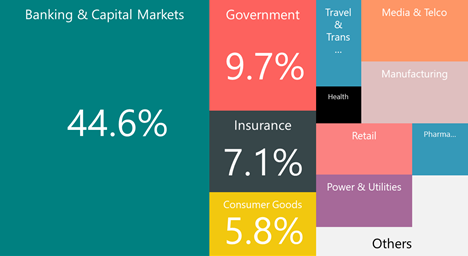The Government of India, in its 2018 budget, has undertaken to explore the use of blockchain proactively for ushering in a digital economy. It has also made clear the distinction between blockchain (that is supports) and Bitcoin cryptocurrency (that it doesn't support).
When is the right time for your business to implement blockchain technology? Is it the right time to invest your capital in the technology and if yes, then will your current capacity or core capabilities be able to bear the overwhelming potential that blockchain has to offer?
But what is blockchain exactly?
And what capabilities make it so attractive for enterprises? Blockchain is a disruptive technology trend that enables a shared, authentic, decentralized ledger that is:
SECURE: Blockchain uses strong cryptography to create transactions that are impervious to fraud and establishes a shared truth. Also, all the transactions are signed with the digital certificate.
SHARED: The real benefits of blockchain, over conventional technology, are achieved when we use it to link organizations to share information on a distributed ledger.
DISTRIBUTED: A blockchain can be distributed across multiple organizations and becomes more secure as replicas are added.
LEDGER: Every transaction is written into the ledger once and cannot be changed after the fact.
What kind of businesses is blockchain best for?
First and foremost, blockchain technology is adept for businesses where large amounts of data is transferred, updated and filtered by multiple users. The potential scenario to apply blockchain depends largely on that. Once we realize that there is a situation that requires the capabilities of blockchain, there arises the need to understand whether a public blockchain is required or an enterprise blockchain is essential.
But what is an enterprise blockchain? An enterprise blockchain (i.e. Hyperlegder, Ethereum Enterprise, Ripple, Quorum, etc.) is a distributed ledger with the following characteristics:
- All the participants, and their digital identities, are known from one or many trusted organizations
- Writes and read permissions are roles-based and usually requires consensus of several participants
- Multiple algorithms are used for consensus
There are two types of enterprise blockchain:
-
Private: Usually managed by a single organization. Typically, the network participants are internal business units or divisions.
-
Consortium: In this case, the blockchain network is managed by multiple trusted organizations. New participants require a consensus of several participants.
Which industries can use blockchain? The potential impact of blockchain is significant across all sectors and industries—from banking to government to healthcare and beyond, as it:
-
Eliminates intermediaries increasing efficiency and speed.
-
Simplifies operations by reducing cost and time related to reconciliations and disputes.
-
Potentially enables new business models increasing revenue and savings.
According to top market analysts and leading consulting firms, the top five industries that blockchain will likely disrupt by 2020 are
financial services, government, real estate, supply chain management, and media distribution. Currently, most active customers using blockchain are financial services institutions, including insurance companies. However, the trend is rapidly shifting to other industries.
More interestingly, a sizeable percentage of blockchain implementations involve at least one participant from a second industry such as manufacturing, government or retail. A few sample customer examples include:
-
Bank of America and Microsoft Treasury using Blockchain in a Trade Finance scenario to improve the process of issuing a Standby Letter of Credit to a customer (SBLC) to a customer.
Impact: The process has been reduced from 3-5 weeks to just 3-5 days.
-
Renault Group is working together with Microsoft and VISEO to create the first digital car maintenance book based on Blockchain and using Microsoft Azure capabilities.
-
Large food manufacturers and distributors are using blockchain to track their premium products journey from source to consumption efficiently, and to have a shared ledger as the single source of truth.
An easy way to get started with Blockchain technologies in the cloud.
Microsoft Azure is taken up as a use case here. Microsoft Azure Blockchain is the cloud platform for BankChain, a blockchain consortium of 30 top banks
. Companies are creating innovative applications on top of Azure for near real-time cross-border remittance at near zero cost, real-time peer-to-peer transfer systems with automated reconciliation, end-to-end loan syndication process management, vendor onboarding, NDA processing, and vendor rating and many more. The State Bank of India, India's largest bank is
using Primechain's blockchain-enabled smart contracts and KYC.
For enterprises, they can look forward to using cloud technology to test the waters with blockchain's enterprise readiness. Currently, Microsoft Azure supports the most widely used blockchain and distributed ledger protocols on Azure, including HyperLedger Fabric, R3 Corda, Quorum, Chain Core and BlockApps.
Some principles that enterprises should look forward to are as follows:
-
Blockchain on your terms: No one-size-fits-all approach — The platform and the ecosystem partners should make it easy to get started and iterate quickly with the blockchain of your choice, both on-premises and in the cloud.
-
Integrated with your business: Merge blockchain with the IT assets you already have. The platform should let you integrate blockchain with the cloud services your organization uses to power shared processes.
-
Ready for the enterprise: With the
Coco Framework,
Cryptlets, and Azure services integrations, Microsoft is addressing existing technology gaps with blockchain and helps organizations build durable enterprise-grade applications.


WordPress.com



Comments